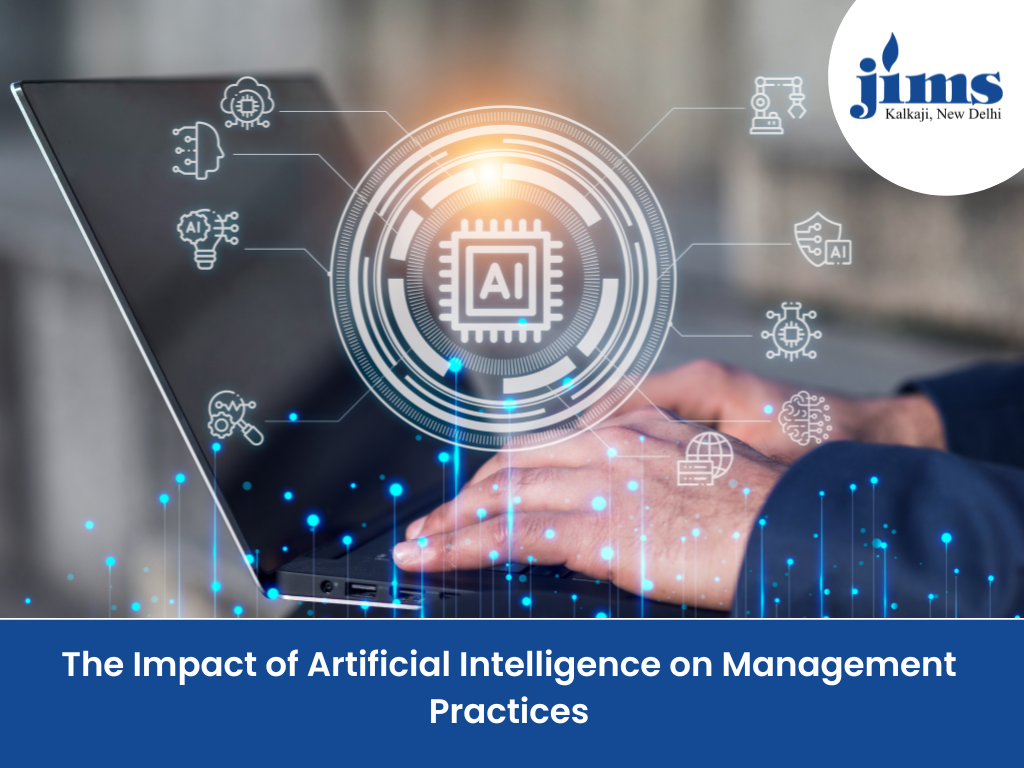Introduction:
In the ever-evolving landscape of business, the integration of Artificial Intelligence (AI) has become a transformative force, reshaping traditional management practices and paving the way for unprecedented efficiencies. As AI technologies continue to advance, organizations, including esteemed institutions such as JIMS Kalkaji, one of the best MBA college in Delhi is compelled to adapt their management strategies to harness the full potential of these innovations. This article explores the multifaceted impact of AI on management practices, delving into key areas such as decision-making, workforce dynamics, and strategic planning.
-
Enhanced Decision-Making with AI:
One of the most significant impacts of AI on management is its ability to enhance decision-making processes. AI systems, equipped with advanced algorithms and machine learning capabilities, can analyze vast datasets at speeds unimaginable to human counterparts. This empowers managers with data-driven insights, enabling more informed and strategic decision-making. From predictive analytics to risk assessment, AI contributes to a new era of precision in management practices.
-
Optimizing Operational Efficiency:
AI’s integration into management practices extends beyond decision-making to optimizing operational efficiency. Automation of routine tasks, powered by AI-driven technologies, allows managers to redirect their focus towards more complex and value-added activities. This not only reduces the risk of human error but also fosters a more streamlined and productive work environment.
-
Transforming Workforce Dynamics:
AI’s impact on management practices is perhaps most noticeable in its influence on workforce dynamics. AI systems can handle repetitive tasks, freeing up employees to engage in more creative and strategic endeavors. The human-AI collaboration is redefining job roles and creating opportunities for upskilling. Effective management in this context involves understanding the changing nature of work and fostering a culture of continuous learning.
-
Strategic Planning and Forecasting:
AI’s analytical prowess plays a pivotal role in strategic planning and forecasting. By analyzing historical data and identifying patterns, AI systems assist managers in anticipating market trends and making proactive strategic decisions. This foresight is invaluable in a dynamic business environment, where adaptability and agility are key elements of successful management.
-
Personalized Customer Experiences:
In industries where customer engagement is paramount, AI’s impact on management is evident in the delivery of personalized customer experiences. AI-powered chatbots and recommendation systems analyze customer behavior, preferences, and feedback to tailor interactions. Managers need to leverage these technologies to create customer-centric strategies that enhance satisfaction and loyalty.
-
Challenges and Ethical Considerations:
While the benefits of AI in management practices are clear, there are challenges and ethical considerations that cannot be ignored. Managers must navigate issues such as data privacy, transparency, and the potential for bias in AI algorithms. Addressing these concerns is integral to responsible AI adoption and effective management in the age of artificial intelligence.
-
Reskilling the Workforce:
As AI continues to reshape management practices, a crucial aspect is the reskilling of the workforce. Managers play a pivotal role in facilitating this transition, ensuring that employees acquire the necessary skills to collaborate effectively with AI technologies. This involves identifying skill gaps, implementing training programs, and fostering a culture of adaptability.
-
Cybersecurity and AI:
With the integration of AI comes an increased reliance on digital technologies, making cybersecurity a pressing concern for managers. The potential vulnerabilities associated with AI systems necessitate robust cybersecurity measures. Managers must be well-versed in cybersecurity practices to safeguard organizational data and maintain the trust of stakeholders.
-
AI and Diversity in the Workplace:
AI algorithms, if not carefully designed, can perpetuate biases present in historical data. This poses a challenge to diversity and inclusion efforts within organizations. Effective management involves addressing these biases, promoting diversity in AI development teams, and ensuring that AI technologies contribute to, rather than hinder, workplace inclusivity.
-
The Future of AI-Driven Management:
Looking ahead, the future of AI-driven management holds exciting possibilities. As AI technologies continue to evolve, managers will have access to even more sophisticated tools for analysis, forecasting, and decision-making. The challenge lies in staying abreast of these developments, integrating them responsibly, and leveraging AI to drive innovation while maintaining a human-centric approach to management.
Conclusion:
In conclusion, the impact of Artificial Intelligence on management practices is profound and far-reaching. From revolutionizing decision-making to transforming workforce dynamics, AI is reshaping how organizations operate and compete in the global marketplace. As managers, including those at JIMS Kalkaji, one of the top MBA college in Delhi NCR navigate the challenges and opportunities presented by AI, a strategic and ethical approach is essential. Embracing AI as a tool for augmentation, rather than replacement, empowers managers to lead their organizations, including educational institutions like JIMS Kalkaji, into a future where the synergy between human intelligence and artificial intelligence defines success in the dynamic business and academic landscape.

